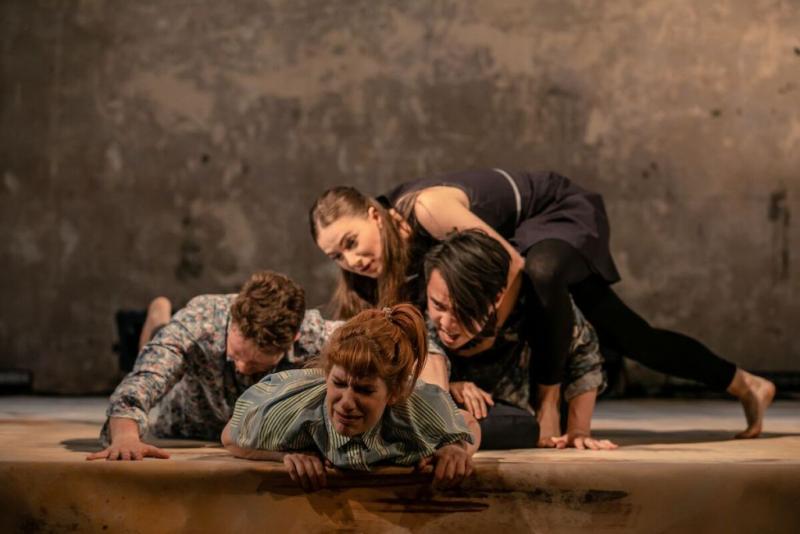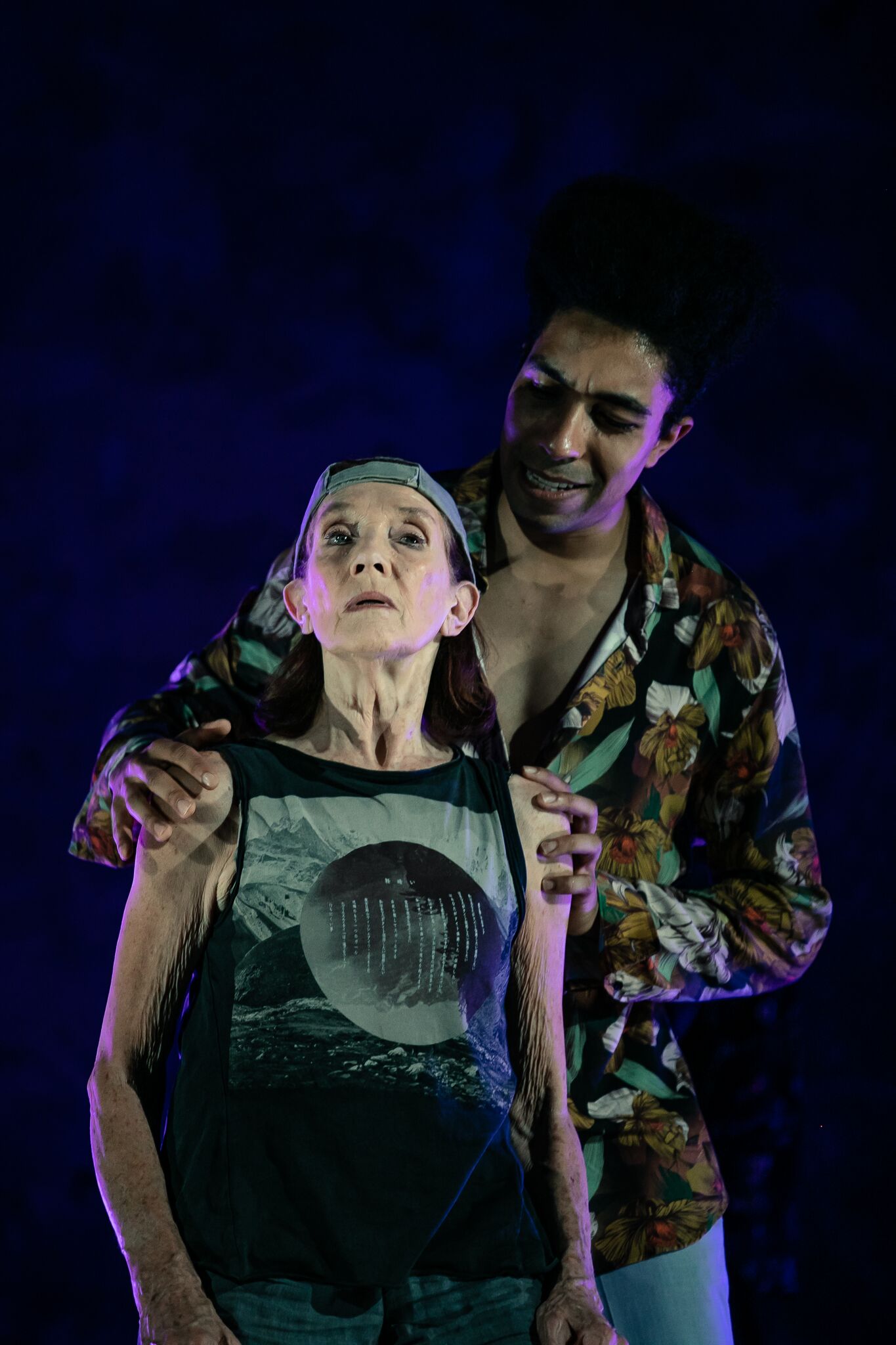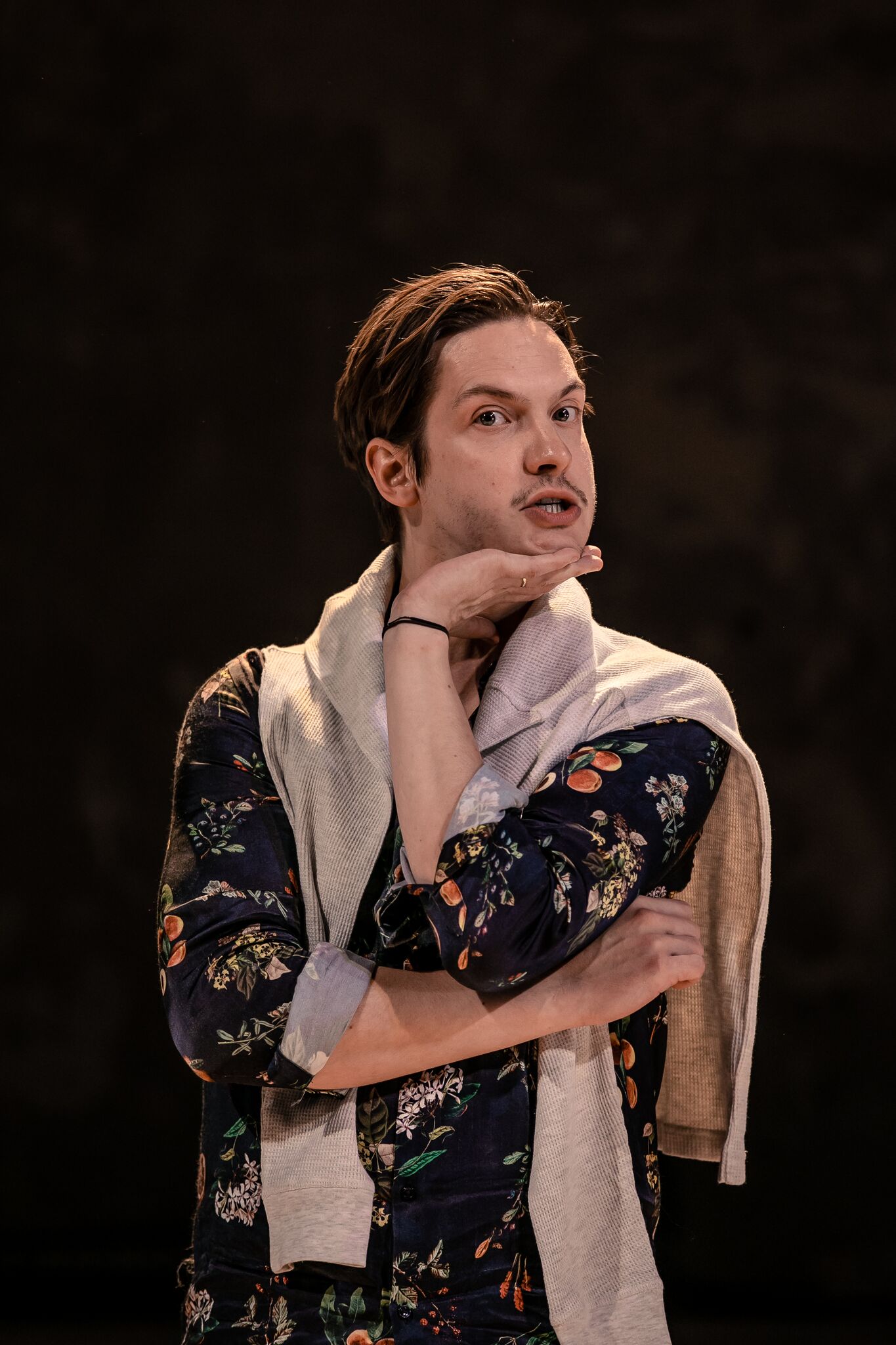A Midsummer Night's Dream, Wilton's Music Hall review - a stereotype-smashing evening of pagan delights | reviews, news & interviews
A Midsummer Night's Dream, Wilton's Music Hall review - a stereotype-smashing evening of pagan delights
A Midsummer Night's Dream, Wilton's Music Hall review - a stereotype-smashing evening of pagan delights
The Faction brings fire and gumption to Shakespeare

The Faction’s A Midsummer Night’s Dream is a production in which women are more likely to kick ass than sleep with one – a muscular, mischievous take on the Bard’s most light-hearted play about forbidden love.
Allusions to the moon weave themselves like a silver thread through A Midsummer Night’s Dream’s text, as both a harbinger of change and of the lunatic merriment that prevails. How apt, then, that Eleanor Field’s gorgeously stark set is dominated by a large and ravaged spherical paper lantern, which flickers and shifts colour as the action unfurls beneath.
 Today, one of the most shocking aspects of the play is to realise that it opens with the prospect of an honour killing. Hermia’s father Egeus informs the Duke Theseus that she should marry the partner he wants her to or "I may dispose of her…to her death, according to our law." In the one miscalculation of the evening, the production – which makes much of its gender-balanced casting – turns Egeus into a woman, played by Berkoff muse Linda Marlowe. Marlowe is wonderful elsewhere as a wirily gobby Puck (pictured right, with Herb Cuanalo as Oberon: one of his three roles), yet if the production truly wants to challenge patriarchal attitudes, it seems strange to have a mother pledging her daughter’s death if she does not do what society deems fit.
Today, one of the most shocking aspects of the play is to realise that it opens with the prospect of an honour killing. Hermia’s father Egeus informs the Duke Theseus that she should marry the partner he wants her to or "I may dispose of her…to her death, according to our law." In the one miscalculation of the evening, the production – which makes much of its gender-balanced casting – turns Egeus into a woman, played by Berkoff muse Linda Marlowe. Marlowe is wonderful elsewhere as a wirily gobby Puck (pictured right, with Herb Cuanalo as Oberon: one of his three roles), yet if the production truly wants to challenge patriarchal attitudes, it seems strange to have a mother pledging her daughter’s death if she does not do what society deems fit.
This aside, there is much to savour in an evening that spits fire and gumption from the moment that Cuanalo’s Afro-haired Theseus and Tamarin McGinley’s statuesque silver-trousered Hippolyta stride across the stage. The talk is of their impending nuptials, but from the moment that Hippolyta aims an invisible arrow at Theseus’s genitals it is clear that the battle of the sexes must be fully played out before any prizes can be claimed. Quickly the central lovers are introduced: Lowri Izzard’s fierily demure Hermia; Jeremy Ang Jones’ comically idealistic Lysander; Laura Evelyn’s defiantly quirky Helena; and Christopher York’s gloriously pop-eyed and uptight Demetrius. Barefoot and trendily attired, they look like kids off to an indie rock festival, with the crucial difference that when the anarchy starts it will be Puck and Oberon calling the shots.
The Faction celebrates its tenth birthday this year and was initially inspired by the visceral theatrical style of Germany’s Schaubühne Theatre. While it exploits A Midsummer Night Dream’s comedy to the full – not least with Christopher Hughes’ snickering, bombastic Bottom (pictured below) – it emphasises the play’s darker aspects to great effect.
 The fairies are no fey textual decoration but a manifestation of sinister forces. When Puck and Oberon speak, the moon darkens and the auditorium is pervaded with the elemental whispers of Yaiza Varona’s unsettling electronic soundscape. Marlowe, astoundingly agile at 77, scuttles around delivering Puck’s malignly magical riddles in dour street tones. Most extraordinary is when she leaps onto Bottom’s back and raises her hands as donkey’s ears above his head, grimacing triumphantly so that when he’s transformed it seems as if she is a parasitic evil spirit and he is possessed.
The fairies are no fey textual decoration but a manifestation of sinister forces. When Puck and Oberon speak, the moon darkens and the auditorium is pervaded with the elemental whispers of Yaiza Varona’s unsettling electronic soundscape. Marlowe, astoundingly agile at 77, scuttles around delivering Puck’s malignly magical riddles in dour street tones. Most extraordinary is when she leaps onto Bottom’s back and raises her hands as donkey’s ears above his head, grimacing triumphantly so that when he’s transformed it seems as if she is a parasitic evil spirit and he is possessed.
The laughs are also deftly handled, not least by Evelyn’s funny-boned Helena who deals with some of the most uncomfortable aspects of the text – did "Use me as your spaniel" ever ring well? – by mining them for their full absurdity. York, too, deserves a special mention, whether for his prissy, muddle-headed Demetrius, or his hilariously tense Snout, whose aching self-consciousness makes him easily the funniest Wall I have ever seen in the re-enactment of Pyramus and Thisbe. Special mentions are almost unfair since there is not one weak link in this cast – whether it’s Izzard hilariously administering martial arts-aided put-downs to the men, or McGinley delivering her lines with the hauteur of a latterday Katharine Hepburn.
Director and co-founder of the company Mark Leipacher keeps an admirably tight rein on the anarchy throughout. His fascinating decision to cast the lovers as four of the rude mechanicals allows him to ramp up the comic sense of disorientation with swift jumps between the main plot and the chaotic, farcical rehearsals. It all adds to the sense of a vigorous reworking of a text that itself already contains more than enough subversion to keep a 21st century audience happy. A wonderful way to spend one of these light-filled midsummer nights.
rating
Explore topics
Share this article
The future of Arts Journalism
You can stop theartsdesk.com closing!
We urgently need financing to survive. Our fundraising drive has thus far raised £49,000 but we need to reach £100,000 or we will be forced to close. Please contribute here: https://gofund.me/c3f6033d
And if you can forward this information to anyone who might assist, we’d be grateful.

Subscribe to theartsdesk.com
Thank you for continuing to read our work on theartsdesk.com. For unlimited access to every article in its entirety, including our archive of more than 15,000 pieces, we're asking for £5 per month or £40 per year. We feel it's a very good deal, and hope you do too.
To take a subscription now simply click here.
And if you're looking for that extra gift for a friend or family member, why not treat them to a theartsdesk.com gift subscription?
more Theatre
 The Importance of Being Earnest, Noël Coward Theatre review - dazzling and delightful queer fest
West End transfer of National Theatre hit stars Stephen Fry and Olly Alexander
The Importance of Being Earnest, Noël Coward Theatre review - dazzling and delightful queer fest
West End transfer of National Theatre hit stars Stephen Fry and Olly Alexander
 Get Down Tonight, Charing Cross Theatre review - glitz and hits from the 70s
If you love the songs of KC and the Sunshine Band, Please Do Go!
Get Down Tonight, Charing Cross Theatre review - glitz and hits from the 70s
If you love the songs of KC and the Sunshine Band, Please Do Go!
 Punch, Apollo Theatre review - powerful play about the strength of redemption
James Graham's play transfixes the audience at every stage
Punch, Apollo Theatre review - powerful play about the strength of redemption
James Graham's play transfixes the audience at every stage
 The Billionaire Inside Your Head, Hampstead Theatre review - a map of a man with OCD
Will Lord's promising debut burdens a fine cast with too much dialogue
The Billionaire Inside Your Head, Hampstead Theatre review - a map of a man with OCD
Will Lord's promising debut burdens a fine cast with too much dialogue
 50 First Dates: The Musical, The Other Palace review - romcom turned musical
Date movie about repeating dates inspires date musical
50 First Dates: The Musical, The Other Palace review - romcom turned musical
Date movie about repeating dates inspires date musical
 Bacchae, National Theatre review - cheeky, uneven version of Euripides' tragedy
Indhu Rubasingham's tenure gets off to a bold, comic start
Bacchae, National Theatre review - cheeky, uneven version of Euripides' tragedy
Indhu Rubasingham's tenure gets off to a bold, comic start
 The Harder They Come, Stratford East review - still packs a punch, half a century on
Natey Jones and Madeline Charlemagne lead a perfectly realised adaptation of the seminal movie
The Harder They Come, Stratford East review - still packs a punch, half a century on
Natey Jones and Madeline Charlemagne lead a perfectly realised adaptation of the seminal movie
 The Weir, Harold Pinter Theatre review - evasive fantasy, bleak truth and possible community
Three outstanding performances in Conor McPherson’s atmospheric five-hander
The Weir, Harold Pinter Theatre review - evasive fantasy, bleak truth and possible community
Three outstanding performances in Conor McPherson’s atmospheric five-hander
 Dracula, Lyric Hammersmith review - hit-and-miss recasting of the familiar story as feminist diatribe
Morgan Lloyd Malcolm's version puts Mina Harkness centre-stage
Dracula, Lyric Hammersmith review - hit-and-miss recasting of the familiar story as feminist diatribe
Morgan Lloyd Malcolm's version puts Mina Harkness centre-stage
 Reunion, Kiln Theatre review - a stormy night in every sense
Beautifully acted, but desperately grim drama
Reunion, Kiln Theatre review - a stormy night in every sense
Beautifully acted, but desperately grim drama

Add comment